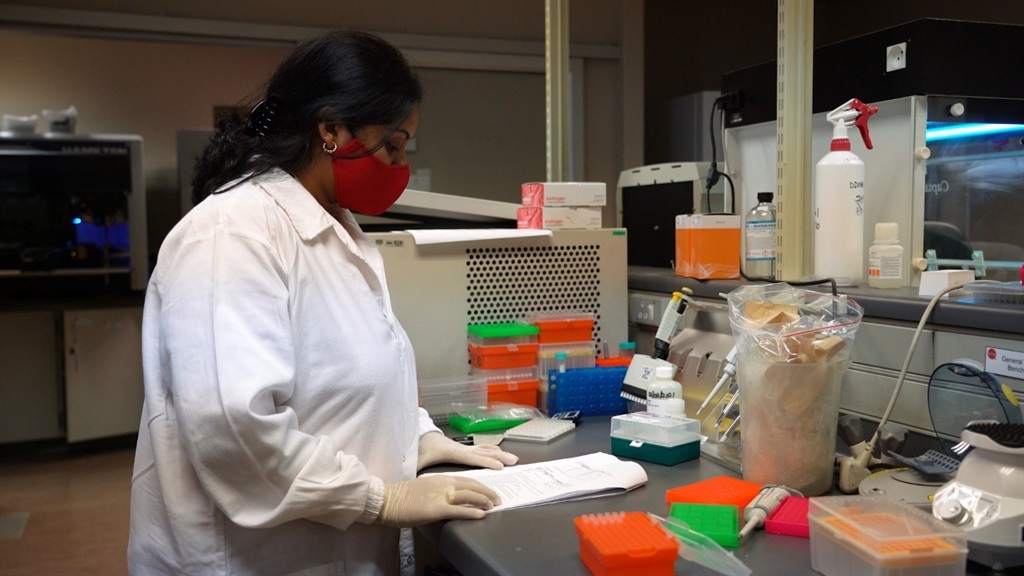
The Department of Science and Technology is punching above its weight as it assists researchers to conduct cutting-edge research into the Covid-19 pandemic, writes Blade Nzimade.
It has been a year since South Africa and the world embarked on the unprecedented step of imposing far-reaching lockdowns on many aspects of social, economic and political life.
For the first time in modern history, borders were closed, forcing international travel and domestic movement to shut down. Not since war times have societies had to endure curfews, prohibitions on social gatherings and other measures that have drastically curtailed socio-economic activity, such has been the impact of SARS-CoV-2, the virus that causes Covid-19.
The pandemic has put the best of health systems under severe strain and decimated economies. The loss of life has been heartbreaking, to say the least, with more than two million deaths worldwide and more than 52 000 South Africans having succumbed to the virus.
The resulting global crisis has thrust science, technology and innovation (STI) into the spotlight, as researchers and scientists worldwide race to find a solution to the scourge. The pandemic demonstrates daily the importance of STI in everyday life, and attention has been drawn to the scientific infrastructure required to conduct research, manufacture vaccines and produce reagents for testing.
More importantly, the pandemic has shown the benefit of having a cohort of leading researchers and experts to provide scientific advice and conduct cutting-edge research. Because of the investments made over the last few decades by the Department of Science and Innovation (DSI), South Africa presides over premier research facilities. It has the necessary skills to guide the country through this challenging period. However, we still do not have all the science infrastructure and resources we need, and much more still needs to be done to build on this foundation.
Investment in infrastructure
The government, through the DSI, has invested in infrastructure to enable world-class research in genomics, epidemiology, and other relevant fields. The DSI has also invested in human resource development to ensure a pipeline of knowledge workers to advance its scientific endeavours.
These investments, and the talent in our national system of innovation, have seen our country produce premier science, contributing to the global body of knowledge on Covid-19 – including the detection of new variants of the novel coronavirus.
Genomic research has proved an incredibly potent tool in the fight against Covid-19.
In response to the pandemic, in May 2020, the DSI contributed funding towards establishment of the Network for Genomic Surveillance in South Africa. Based at the KwaZulu-Natal Research Innovation and Sequencing Platform (Krisp) at the University of KwaZulu-Natal, local scientists led investigations into the evolutionary characteristics of SARS-CoV-2. They detected a new variant, dubbed 501Y.V2.
South African scientists were the first to make these findings, showing that the 501Y.V2 variant has several mutations on its spike protein that increases the virus's ability to infect humans and potentially enables the virus to escape certain vaccines.
READ | Covid-19: Prof Tulio de Oliveira says 2 more variants have been discovered in SA
The DSI is investing R25 million more to ensure the completion of the sequencing of 10 000 SARS-CoV2 genomes in South Africa and Africa. This work will be crucial in shaping the country's ongoing response to the pandemic.
The department has also invested R69.4 million in Covid-19 research and innovation. This covers 21 projects, notable among which is the first plant-based manufacture of antibodies for Covid-19. This study seeks to utilise various plant-based expression platforms to facilitate the rapid development of vaccine candidates, therapeutic antibodies and diagnostic reagents against SARS-CoV-2.
The Council for Scientific and Industrial Research (CSIR) has entered into an agreement with Kentucky Biological Products (KBP) for the potential manufacture of the antigen of their vaccine. The KBP vaccine is manufactured through the use of specific tobacco plants. The CSIR can expand its facility for plant-based expression systems to simulate the antigen needed for the vaccine. KBP has also expressed interest in testing the vaccine in South Africa. The total DSI investment in this study is in the region of R2.4 million.
Storage facilities for vaccines
As the country rolls out the Johnson & Johnson vaccine to frontline workers, it is important to note that Covid-19 vaccines require state-of-the-art storage facilities. The vaccines are being stored at Biovac, a Cape Town-based biopharmaceutical company with a Gauteng distribution centre. Biovac is the result of a partnership formed with the State in 2003 to establish a local vaccine-manufacturing capability for national health management and security. The Biovac Consortium holds 52.5% of the shares in Biovac, while the DSI and its entity, the Technology Innovation Agency, hold the remaining 47.5%.
Biovac, the only company in South Africa with established vaccine production capability, is of national strategic importance for increasing productivity and competitiveness in the large molecule production industry. This will positively impact the country's trade balance, job creation, and skills development while strengthening the primary and secondary value chain within the industry.
As the only cGMP-licensed (current Good Manufacturing Practice) vaccine manufacturer for the formulation, filling, packaging and cold chain distribution of vaccines in the country, Biovac currently provides approximately 80% of South Africa's vaccines. The company has also established successful technology transfers for two global vaccine products, Hexaxim® and Prevenar13®.
As a department, we are confident that an indigenous vaccine capability can successfully be developed with adequate funding. We have the facilities, knowledge, workers and requisite capacity to fulfil this mission. We have made significant investments in diagnostic tests, targeted surveillance, therapeutic trials for treatment – including prophylactic treatment of healthcare workers and highly exposed people – and the development of monoclonal antibodies, immunoglobulins and vaccines.
We have also invested significantly in data modelling and, to this end, together with the Department of Health and the CSIR, we launched a situational awareness platform for Covid-19 in March 2020. The centre provides close to real-time analytics on the coronavirus outbreak per province, district, local municipality and ward. It also provides a single view of the reality of the Covid-19 spread across the country.
The centre's advantageous capability is its mobile visualisation platform, the CMORE app, which community health workers use to record screening data and symptoms and transmit information to the centre. This enables the near-live display of the national Household Screening and Testing Programme.
The centre's data and insights are a significant input for decision-making by the National Coronavirus Command Council, chaired by President Cyril Ramaphosa. The department is also part of the National Joint Operations Committee on Covid-19, coordinating government-wide efforts and reports to the NCCC.
In support of the government-wide response, the DSI has partnered with sister departments on groundbreaking work. A case in point is the DSI's collaboration with the Department of Trade, Industry and Competition on the first-ever locally manufactured ventilators. Engineers from the DSI's entity, the South African Radio Astronomy Observatory (Sarao), applied their expertise to design and manufacture non-invasive ventilators. The Sarao is world renowned for its development of complex systems for the MeerKAT, a precursor to the Square Kilometre Array, which will be the world's largest radio telescope.
With the Department of Defence, another partnership saw the DSI using hydrogen fuel cell technology to provide energy to the Covid-19 field hospital at 1 Military Hospital in Pretoria. The department participates in the World Health Organisation's Committee on African Traditional Medicine in response to Covid-19.
African medicines
The DSI has partnered with several organisations to research the use of African medicines as immune modulators and Covid-19 therapies. This research is being carried out through the African Medicines Platform of the DSI's Indigenous Knowledge-Based Bio-Innovation Programme.
An African Medicines Covid-19 Research Team has been established, comprising scientists and experts from universities, science councils, healer organisations and technology incubators. The team is studying some South African herbs and formulations with documented evidence to treat respiratory infections. One of these is Artemisia Afra, also known as African wormwood. This is an indigenous species of the Artemisia family and is a different species from Artemisia annua, which is cultivated in Madagascar.
Through the National Skills Fund (NSF) and the Agri-SETA joint funding, we will be providing bursaries to approximately 4 000 students who are studying at agricultural colleges, using National Student Financial Aid Scheme (NSFAS) criteria.
This funding will also ensure that we continue to support small-scale black farmers and implement the poultry master plan and the sugar master plan, among others.
We will work very closely with the Department of Agriculture and Agrarian reform to restore the physical infrastructure of these agricultural colleges.
Although there is much to be done to enhance our nation's biosecurity and resilience in anticipation of future pandemics, I can safely say that the Department of Science and Innovation is punching above its weight. Covid-19 has proved that the country has a premier scientific capability that supports the country and contributes continentally and internationally to saving lives.
- Dr Blade Nzimande is the Minister of Higher Education, Science and Innovation.
*Want to respond to the columnist? Send your letter or article to opinions@news24.com with your name and town or province. You are welcome to also send a profile picture. We encourage a diversity of voices and views in our readers' submissions and reserve the right not to publish any and all submissions received.
Disclaimer: News24 encourages freedom of speech and the expression of diverse views. The views of columnists published on News24 are therefore their own and do not necessarily represent the views of News24.




 Publications
Publications
 Partners
Partners
























